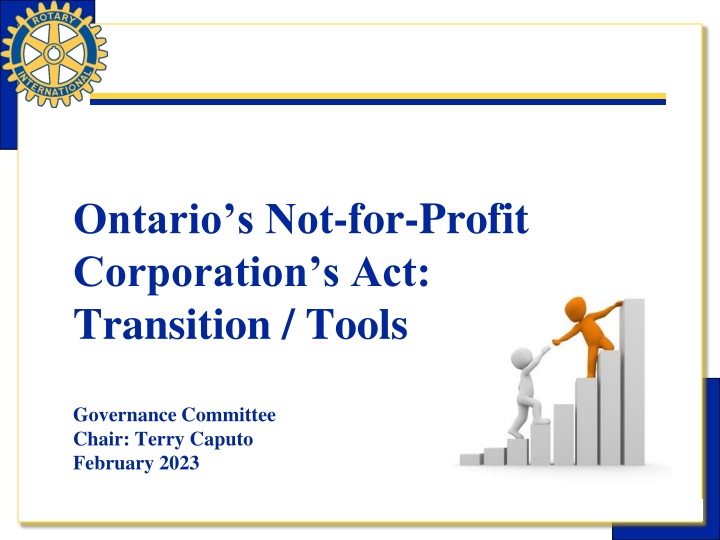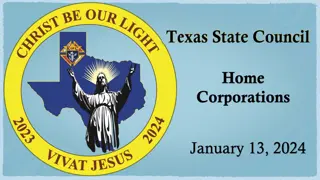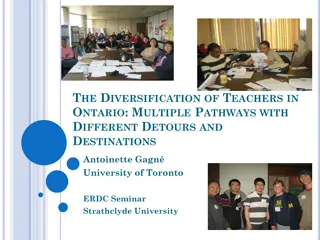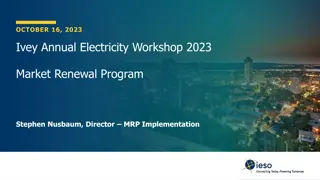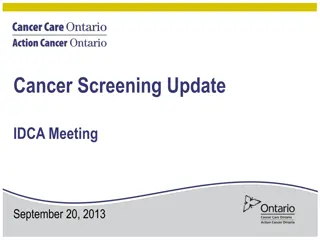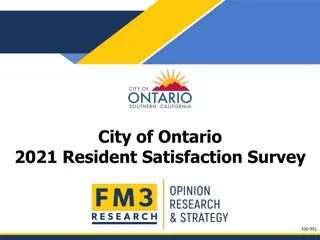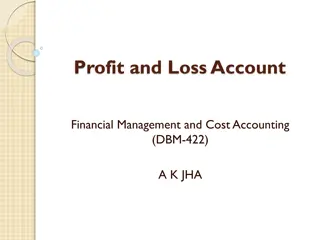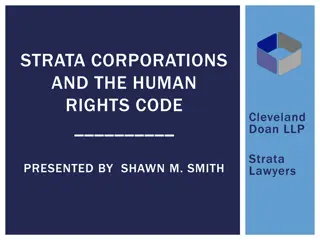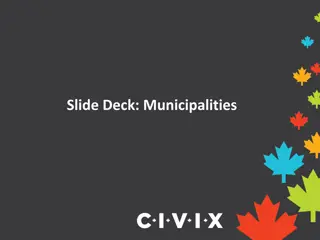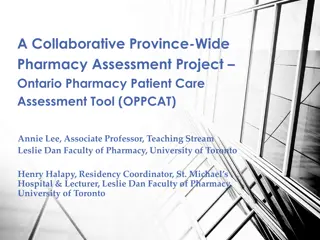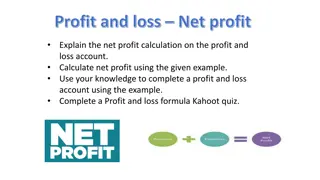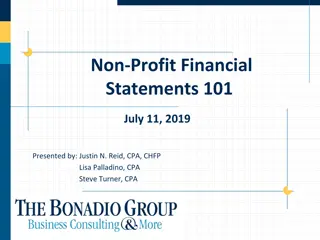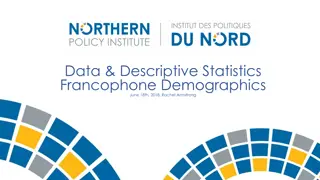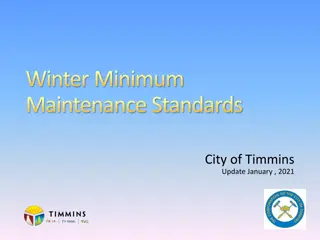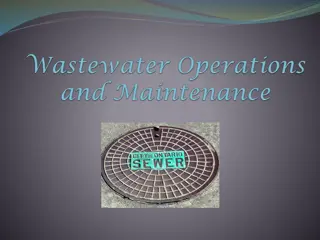Transition to Ontario's Not-for-Profit Corporations Ac
Legislation in Ontario is changing with the introduction of the Not-for-Profit Corporations Act. Understand the implications of ONCA, key terms, and why governance alignment is crucial. Explore new standards for Public Benefit Corporations and more.
Uploaded on Mar 02, 2025 | 0 Views
Download Presentation

Please find below an Image/Link to download the presentation.
The content on the website is provided AS IS for your information and personal use only. It may not be sold, licensed, or shared on other websites without obtaining consent from the author.If you encounter any issues during the download, it is possible that the publisher has removed the file from their server.
You are allowed to download the files provided on this website for personal or commercial use, subject to the condition that they are used lawfully. All files are the property of their respective owners.
The content on the website is provided AS IS for your information and personal use only. It may not be sold, licensed, or shared on other websites without obtaining consent from the author.
E N D
Presentation Transcript
Ontarios Not-for-Profit Corporation s Act: Transition / Tools Governance Committee Chair: Terry Caputo February 2023 Rotary eLearning Center- Community Service
Objective What s new in ONCA What steps do clubs need to take Resources available Project Plan for Clubs Rotary eLearning Center- Community Service
What is ONCA? ...legislation that most not-for- profits incorporated under provincial law will need to follow that replaces Ontario s Corporations Act Rotary eLearning Center- Community Service
Key Terms Letters Patent Now called articles The document the government gave you when you incorporated It includes your purposes, address, and other special rules Members The people who are called members in your bylaws Have governance powers like electing the directors or appointing the auditor Rotary eLearning Center- Community Service
Why is this important 1. Opportunity to revisit your governance and align your bylaws with your policies and procedures 2. Opportunity to simplify your bylaws and take out unnecessary detail Move detail procedures outside of bylaws to be able to change easily 3. Some new things are possible 4. Avoid confusion later on Rotary eLearning Center- Community Service
Whats new Public Benefit Corporations Financial Review Standards Member Rights/Remedies Changes for Directors/Officers Ontario Business Registry Rotary eLearning Center- Community Service
Public Benefit Corporation (PBC) A not-for-profit is a PBC if it: Is a registered charity (i.e. foundation), or Receives more than $10,000 in: Grants or financial assistance from the government Gifts or donations from sources other than members, directors, officers, or employees Events revenue not counted Measured annually in arears and starts after the AGM Rotary eLearning Center- Community Service
Public Benefit Corporation Face a higher standard of financial review Can distribute their property only to the government or a similar PBC if they dissolve Can t have more than a third of its directors be employees Rotary eLearning Center- Community Service
Financial Review Standards Important Note: The default is an audit, therefore, ensure you pass the extraordinary resolution at the AGM. Rotary eLearning Center- Community Service
Member vs. Director As a reminder Members and directors have distinct roles within a corporation even if members and directors are one and the same Members are similar to shareholders of a for-profit corporation (but are not owners ) Directors are responsible for the management the corporation s activities Directors have fiduciary obligations; members do not Rotary eLearning Center- Community Service
Member Rights/Remedies Members can remove directors by ordinary resolution (51% vote) vs 2/3 vote Can not remove directors appointed by virtue of their role (ex-officio,i.e. President) using an ordinary resolution Right to remove auditors or person conducting a review by ordinary resolution Notice of meeting 10 days to 50 days Notice of special business meetings ensure members have enough information to decide Rotary eLearning Center- Community Service
Member Rights/Remedies Proxy voting needs to be permitted by article or bylaw recommend requirement that proxy holder has to be a member Voting normally by hand consider adding to bylaw ballot, mail, telephonic and electronic means Must be able to verify identity of member Use voting function that does not show how member voted Right to examine various records, except minutes of directors meeting and board resolutions Rotary eLearning Center- Community Service
Member Rights/Remedies Members holding 10% of votes (can be lower level if bylaw) can call a meeting Meeting to be called in 21 days or can be held by members requisitioning Exceptions no obligation to call meeting for personal issues Right to make a proposal must be submitted 60 days before meeting Rotary eLearning Center- Community Service
Member Rights/Remedies Members can now bring lawsuits on behalf of the corporation against even the directors, if: they have provided notice to the director and the Court has found it is in the interest of the corporation for the member to carry on the action. Rotary eLearning Center- Community Service
Changes for Directors/Officers Composition Min 3, ex officio allowed, one-time special resolution to fix directors Term of Directors 4 years that has unlimited renewals Important Note: Directors must consent to take office within 10 days of being elected. Recommend creating a form and have them sign at the AGM Rotary eLearning Center- Community Service
Changes for Directors/Officers Standard of Care for Directors ONCA allows for indemnification Reasonable diligence defense Directors Deemed Assent Have consented to decisions unless dissent is registered (i.e. minutes) Have 7 days to dissent when you become aware of a decision (i.e. if missed meeting) Rotary eLearning Center- Community Service
Changes for Directors/Officers Directors Conflicts of Interest - broadened Cannot attend portion of meeting Cannot vote Changes in Required Officers Directors can serve as officers Directors must appoint a chair (i.e. customary that President is chair) Rotary eLearning Center- Community Service
Ontario Business Registry Benefits of the new online registry: Look up Ontario corporations online Make your annual filings and change your articles online Response to changes in real time Automatically share information with the Public Guardian and Trustee, but not Canada Revenue Agency Rotary eLearning Center- Community Service
What steps to take Step 1: Does ONCA applies to you Step 2: When you need to act Step 3: Get your books in order Step 4: Update your bylaw Step 5: Update and file articles of amendment Rotary eLearning Center- Community Service
Step 1: Does ONCA apply Applies to not-for-profits incorporated under: Ontario s Corporations Act Most special Acts -in case of conflict, special Act applies Does not apply to not-for-profits incorporated under: Canada Not-for-Profit Corporations Act Co-operative Corporations Acts Business Corporation Acts Unincorporated Association Rotary eLearning Center- Community Service
Incorporating a Club District 7070 is using Nonprofit Law Ontario as a reference site for both incorporation and transition to ONCA processes Resources provided by Community Legal Education Ontario (CLEO) Develop clear, accurate and practical legal education and information Website: https://nonprofitlaw.cleo.on.ca/ Rotary eLearning Center- Community Service
What is your status? Are you incorporated or not under: Provincial - Ontario Business Registry Federally - Corporations Canada Registered charity - CRA Charity Database? Not incorporated Considered an unincorporated association Rotary eLearning Center- Community Service
Why incorporate? Corporations: Are legally independent from its members; any liability is limited to corporation s insurance/assets Have stronger governance legally required through bylaws Required to keep records and file returns Can enter into contracts, sue and be sued and hold property Unincorporated associations: Are not independent from the members; exposes members to personal liability No simple legal mechanism to enforce governance Rotary eLearning Center- Community Service
Incorporate as a charity? Charities use resources for charitable activities and have charitable purposes that must fall into: The relief of poverty The advancement of education The advancement of religion (not apply to Rotary) Other purposes that benefit the community Approved by CRA and follow stringent rules on tax receipting and disbursement of funds Enforce a higher level of fiduciary responsibility Question: Is a tax receipt worth all the additional trouble? Rotary eLearning Center- Community Service
Step 2: When you need to act October 19, 2021: ONCA took effect Until October 18, 2024: Old (valid) letters patent and bylaws continue to be valid After October 19, 2024: Letters patent and bylaws automatically changed to comply with ONCA, except key provisions: number of directors member classes and voting rights dissolution clauses Rotary eLearning Center- Community Service
Step 3: Get books in order Collect the following documents: Letters patent and supplementary letters patent Bylaw Minute books Special resolutions Directors and officers register Director consent forms Members register Financial statements Governance documents Rotary eLearning Center- Community Service
Step 4: Update your bylaws Some examples of changes required: You must appoint a chair Allow corporation to be eligible for membership? Class of member recommend one class What % of members can a members meeting Whether to allow proxy voting Rotary eLearning Center- Community Service
Step 5: Update file articles What might need to change: Purposes: reflect your club s goals? Number of Directors: minimum 3 Membership classes and voting rights Restrictions on powers: borrowing, selling key assets To file articles of amendment, you need a: CompanyKey: Ask for it ONe-Key: Sign up online Services Ontario Account: Sign up online Rotary eLearning Center- Community Service
Completing application Need to insert a company key mailed to registered office Company email address Requested date of articles Confirmation of Authorization- warning re penalties Name: 4 options for English and French Number of Directors fixed or min/max North American Industry Classification System ( NAICS ) code Is the corporation a charity? Does the corporation have consent from PGT not to use the After Acquired Property clause Rotary eLearning Center- Community Service
Resources Various law firm websites Ontario.ca website Nonprofit Law Ontario Look under Resources menu for CLEO s bylaw builder Various tools collected by committee that accompany this presentation Rotary eLearning Center- Community Service
ONCA Transition Plan Set governance Obtain company key Complete documents review Amend by-laws Align policies and terms of reference AGM approval Update corporate register Completion submit to CRA if charity Rotary eLearning Center- Community Service
Example Project Plan See Excel file that accompanies this presentation Rotary eLearning Center- Community Service
Set governance Recuring board agenda item Establish ONCA Committee vs Secretary role Committee should be small and focused Secretary should be chair Create project plan Monthly progress reports Rotary eLearning Center- Community Service
Set governance Recuring board agenda item Establish ONCA Committee vs Secretary role Committee should be small and focused Secretary should be chair Create project plan Monthly progress reports Rotary eLearning Center- Community Service
Obtain company key Secretary sign up for ONe-Key ONe-Key Login Review Ontario Business Registry Instructions for Not- For-Profit Obtain Company Key Sign up with One-Key Review your account Make necessary changes Rotary eLearning Center- Community Service
Complete Documents Review Letters patent Articles of incorporation By-law Club governance document Policies Procedures Terms of reference Minute book Rotary eLearning Center- Community Service
Amend bylaw Review recommended Rotary Club bylaws Review current Club bylaw Use Nonprofit Law Ontario tools Sample by-law with options CELO By-law builder Consider scaling down bylaw to allow for flexibility Consider legal review Rotary eLearning Center- Community Service
Align policies and ToRs Review policies to ensure consistency with bylaw Consider adding items removed from bylaw Create system to ensure compliance with bylaw Review / establish terms of reference for board and committees Rotary eLearning Center- Community Service
Approvals Board approves articles and bylaw and provides adequate time for members to review Members approve articles and bylaw at the AGM Rotary eLearning Center- Community Service
Completion Submit bylaw to CRA if you are a charity Update information Rotary eLearning Center- Community Service
Questions? Feel free to contact me with any follow up questions Terry Caputo (905) 213-5925 terrycaputo@outlook.com Rotary eLearning Center- Community Service
